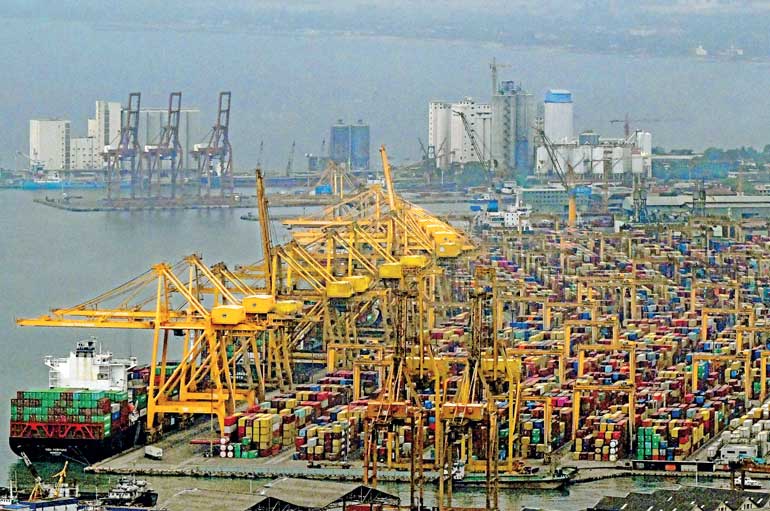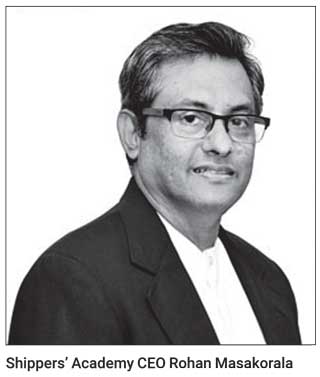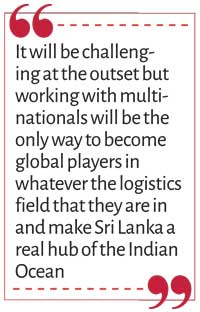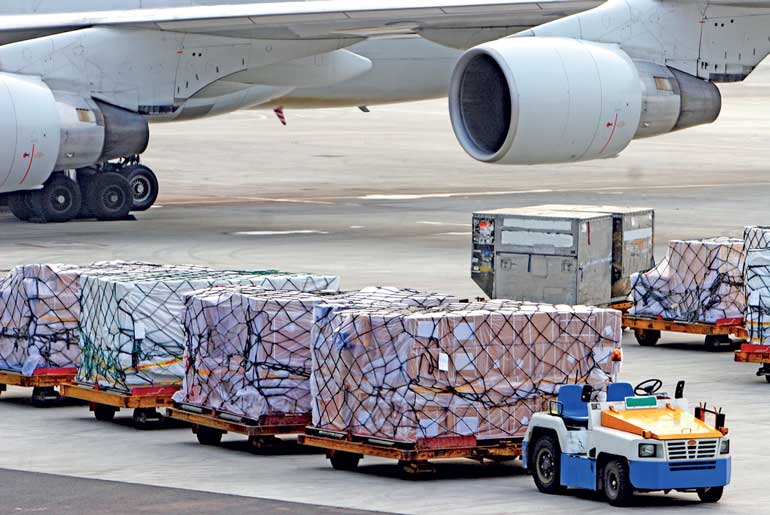Wednesday Feb 18, 2026
Wednesday Feb 18, 2026
Tuesday, 28 September 2021 01:10 - - {{hitsCtrl.values.hits}}

Shippers’ Academy CEO Rohan Masakorala notes that if Sri Lanka wants to convert into an international trade and logistics hub, it needs to create a conducive environment for international capital to flow in. Following are excerpts of an interview with Masakorala:
Q: You have been a proponent of trade and services liberalisation; what is your thinking?
For years if not for decades, I have been speaking and writing many columns that if Sri Lanka wants to make its location a reality and convert into an international trade and logistics hub, such as, Singapore, London, Dubai, etc., we need to create a conducive environment for international capital to flow in. Otherwise, we will be only dreaming and talking of capital inflows, technology transfers and human resource development aspiring to be among the top 20 trade, logistics and shipping hubs of the world. 
It has not happened, and it will not happen under current legal environment and selective restrictions on the sector. Any business owner or an international investor wants at least a minimum control of their core business and investment; I mean at least 51% of control of your own business. I know for a fact, when Sri Lankan companies invest in other countries, they want that control if not 100%, which clearly is logical. No business owner likes to give control of its core business to third parties to control. When doing business with such countries global multinationals will either invest minimum or make them cost centres; never see them as serious hubs or partners.
Q: Sri Lanka has been an open economy since 1977; why is it that other countries like UAE have moved forward?
Indeed, Dubai is a great example for a logistics and a shipping hub; they were way behind us in the late 1980s but the reform and freedom of doing business surpassed us fast.
It is time for governments and political leaders to understand that Sri Lanka must make its presence as a globally investor-friendly location, if it wants to be like our neighbours in the Indian Ocean such as Singapore or Dubai, in the field of international logistics, ports, and shipping, where these services sectors have thrived, grown, and created thousands of jobs. Dubai alone accounts for $ 100 billion turnover in logistics, where 56 international headquarters are located and account for nearly 20% of GDP.
Similarly, Singapore accounts for 10% of GDP on this sector alone, where foreign companies are free to operate without tying them up in parts of their business under government regulations to protect few individuals to reflect commission earners to showcase themselves as the business owners. Government must engage giants of the world in logistics, shipping, and terminal operators if we want to develop all our ports and the surrounding areas to develop into a regional logistics hub which will also support export-led manufacturing.
Q: Recently a logistics company has topped the CSE; how do you view it?
It is an open and shut case for successful liberalisation of the logistics sector and a way forward for other Sri Lankan logistics companies to be listed in the Colombo Stock Exchange. But protectionists did not allow the process to continue after the initial window.
I recall in 2013, the then secretary to the treasury and now secretary to the President Dr. P.B. Jayasundara, took a bold move to open a window for Sagawa Corporation of Japan to invest in Expolanka Holdings which was the first logistics company listed in the main board of CSE. This transaction instantaneously brought in over $ 85 million of capital to the company and the country, breaking the previous record of around $ 20 million through the AMW investment. The result of that far-sighted decision is in front of our eyes today, where Expolanka has become the leading conglomerate, making the logistics industry a shining star in Sri Lanka.
With the foreign capital infusion, the company has managed to expand globally. Its ability to access capital, market access and know-how through its Japanese investment has helped the Expo brand to grow many folds and to increase its revenue and profits surpassing all top local operators in Sri Lanka and join the elite global logistics companies lists in areas such as airfreight. It has employed more people and gives greater returns to its employees and shareholders and to the tax basket, on the contrary to the doomsday protectionist theoreticians who said that it was a wrong move by the then government of Sri Lanka.
There was and is continuous lobbying with the treasury secretary against this window of liberalisation policy saying that the country will lose, people will lose their jobs and therefore, not to allow any majority foreign ownership in the business of shipping and logistics.
Q: But with foreign ownership, does the country really benefit?
Yes, to be fair with the readers, that needs to be explained; one may ask whether the majority shareholder would take the lion share of profits? The global industry does not work like that. If it’s the case, hubs like Singapore, Hong Kong, London, New York, Shanghai, Tokyo, Paris, Dubai, etc. would not allow such models; in fact, they became finance hubs because they opened the total logistics sector too. International partners bring in trust and many multiplier effects and benefits to an economy, and it opens new horizons to the local partner, where it can decide to be a big fish in a small pond or to become a small fish in a big pond.
Let me give an example how I see Expolanka then vs now. The company has now expanded into 23 countries, and it is acquiring new businesses through capital infusion from Japan. All that is new turnover and profit, compared to a small economy like Sri Lanka. In fact, Expo was the first company to invest in Sri Lanka under the commercial hub concept and another investment on a massive fulfilment centre after partnership was established.
Further to clarify, if a company has a market presence in the United States economy alone which is $ 25 trillion, 1% of that would equal to $ 250 billion and the US logistics market is about 7% of GDP; that means the size of the market is $ 1.75 trillion vs just an $ 80 billion economy of Sri Lanka, which is being fought among 200 small companies. The global logistics industry is worth well over $ 5 trillion and it is advisable for our small companies (I would say our micro companies in global standards) to piggy-back with international brands to expand globally, regionally and locally if they want to transform the journey, as their current 40-year journey has not delivered the results we want as a nation. We simply need to make the pie bigger.

Q: What is your view on port development as this area has seen liberalisation?
Well, it has lost its momentum as certain inward-looking forces have raised their heads and government was and is in the backfoot in many areas. ECT in the Port of Colombo was a classic recent example.
Again, Dr. Jayasundara knows liberalisation’s benefits and success more than anyone else as he played the lead role in Expo Lanka’s success too on policy. Telecommunication has shown its own results where late minister Mangala Samaraweera also played a key role, SAGT liberalisation which transformed and opened South Asia’s terminal industry and gave a new face lift to SLPA. Hotels, insurance, banking, and industries such as the apparels have major foreign companies and foreign brands are allowed to invest as they wish.
All these sectors have helped us to move from a lower middle-income country to an upper middle-income country. If we need to go beyond our location story to be a hub and make use of assets such as the Port City, to attract headquarters of the logistics industries, such industries need to be invited with at least minimum 51% ownership and remove all licensing regimes. Just imagine, 10 Sagawa Corporations in Sri Lanka; what will it do to the economy, people, the logistics industry, and the stock market?
Q: Do you think Government policy is right?
Government policy is giving massive mixed signals; that is not going to help us to attract foreign capital and confidence of international players to convert our island into a hub. On one hand, Government has fully liberalised Port City and Hambantota port area where they are all canvassing global companies to come and set up shop here, but if you attach a string on the rest of the island to control their total business activity, specifically on logistics, nothing much is going to happen.
We need to develop Galle, Colombo and Trincomalee, as major logistics centres with maritime infrastructure and best practices infused by international capital, we need to go ahead in full strength and invite global companies to set up headquarters and invest here without any restrictions on profits earned and eliminate the 1970 model of licensing regimes under merchant shipping.
If selective areas are protected to help few, I can tell you all the local SME companies’ doors will be closed to foreign partnerships and they and the country will be the actual losers. One thing we must remember is opening is very important and a strong ombudsman in the system is also important to eliminate anti-competitive behaviour in the market, just like in the developed West. People try to mix these and confuse the governments at times.
Q: How do you view Port of Colombo and Hambantota’s progress?
It is not a secret that I always welcome foreign partnerships in our ports, both in Hambantota and in Colombo. As I said earlier the consortium of SAGT was something new and progressive in South Asia. In the event of Hambantota, I always openly mentioned that the infrastructure project was done at the outset without a proper business, financial and marketing feasibility, which led to the bleeding of the SLPA coffers. I am happy that China has invested in Hambantota but I’m not in full agreement in the way it was done, including the lease period, valuation, and the share to the State, etc. But that is water under the bridge. Hopefully we can develop joint ventures in the Hambantota Free Zone.
In the Port of Colombo too, I always came out promoting consortiums including ECT. I called for transparency and RFPs through tenders. However, openness and transparency are questionable here too. I can tell you one thing in my opinion, If Colombo port wants to retain its position, not only compete with regional ports but Hambantota in the near term, we must partner global shipping lines. Shutting the door for them will lead to Sri Lanka’s importance for them fading away. Specially at a time when global shipowners are making massive profits and minting in money, it is the time for them to partner Colombo to bring in capital, business and help the country integrate into logistics.
In the meantime, India is fully liberalised and is inviting international private sector-led growth in the port sector and partnering shipping lines too. That is why the Government should re-study its policy, especially a top public servant of the calibre of Dr. Jayasundara and Treasury Secretary S.R. Attygalle who has seen the success should relook at this business model at a time where the country is looking for much valued foreign exchange and FDI.
Q: Most local logistics companies are hesitant to open further. Why do you think so?
I feel these are companies and organisations that have been traditionally comfortable with income earned through service rendered commissions of other business owners and processes and are oligopolistic in nature. Its easy business with less innovation specifically when Government protection is given. That is why such an environment takes them into silent mode when key issues such as, PPPs in the port of Colombo, and Hambantota Port development are not challenged in open forums or give candid views, as any business models continue to benefit them irrespective of the country’s larger economic structures but the consequence to the country is hidden.
Keeping competition out is always an easy way to succeed for few people. Most in the industry who control the market do not want their own principles presence in the country due to obvious reasons; professionals across a cross section of the industry understand this. I can remember in 2018 the Ceylon Chamber of Commerce did a survey at the economic summit where out of 450 senior executives, 65% of the professionals there supported the logistics sector liberalisation in a vote, they were a cross section of the financial, banking, logistics, export to many other industries. But the lobby was strong to silent all of them.
In fact, my personal view is I want these local companies to grow like Expolanka, but they read it the wrong way, because of short-sightedness. I sincerely hope they start seeing the big picture, especially the new generation who has seen the world, the other hubs, etc. It will be challenging at the outset but working with multinationals will be the only way to become global players in whatever the logistics field that they are in and make Sri Lanka a real hub of the Indian Ocean.
Q: Are you confident that reform will happen?
To be honest I am not; it is up to the industry to look at their own selves, move away from a protectionist attitude from a small market which has adopted a free economy but have failed to fully use its potential for four decades beyond a transshipment hub. I have experienced and worked in such an environment, and I can only promote such reforms and policy to Government and I’m willing to accept that in many instances in the past I have been a failed policymaker in this area due to the attitudes, the political lobby and somewhat selfish individuals who mislead the political fraternity to take the country backwards even within South Asia while they line their pocket through government protection.
I look forward to a national consensus among political leaders, business leaders and all political parties on managing external investments and partnerships. Otherwise, Sri Lanka will be in the middle-income trap for a longer time although we are sitting in the best location in the Indian Ocean.